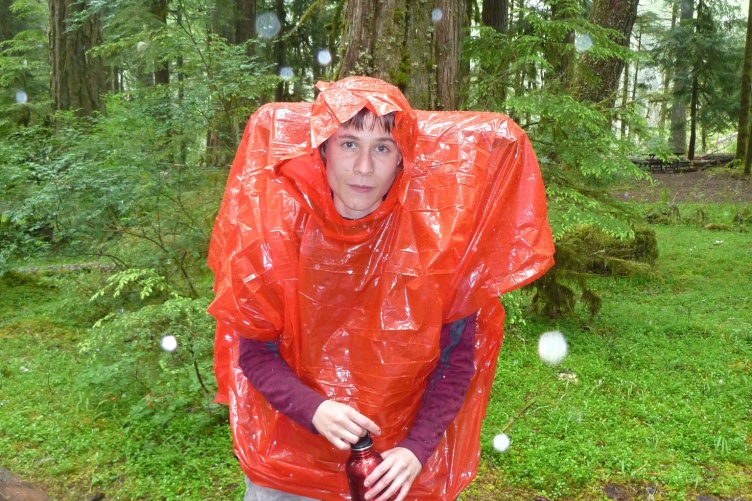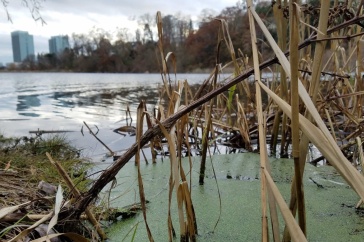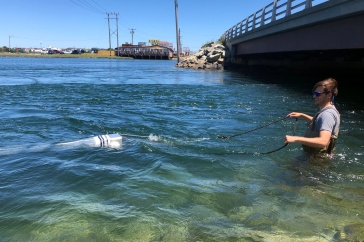
Anna O’Brien, assistant professor in the department of molecular, cellular, and biomedical sciences, joined the UNH College of Life Sciences and Agriculture in March 2022, bringing her deeply inquisitive energy, commitment to work that benefits both the planet and its inhabitants, and love of bright colors to the college.
Her research seeks to understand how microbiomes affect the ability of plants to tolerate changing environmental factors like climate and pollution, and how changing environmental factors alter whether or how microbiomes benefit plants. Her work, vital for a world increasingly shaped by the effects of a changing climate, has significant relevance for the future of agriculture and any ecosystem with plants at its foundation.
COLSA: What is the most interesting thing about you?
Anna O’Brien: I think other people might say it's that I like to dress in bright colors. I think that might be probably the first thing people notice about me. I just find that I feel happy when I see bright colors, and so it's something that I can do to make my day a happier day.
COLSA: What is your current position, and how long have you held it? And can you give me a brief overview of what you do in your work?
Anna: I'm an assistant professor in the department of molecular, cellular and biomedical sciences in COLSA. I've been here just over two years. I am really interested in understanding interactions between hosts and microbial organisms that live on or inside of them and how those microorganisms change what environmental stressors mean for the host.
More specifically, what I work on is microbes that live on plants and how they alter plant responses to stresses, like changing temperatures and rainfall and other environmental conditions.
COLSA: Why is this work important?
Anna: We all have to eat and a lot of our food comes from plants, and we also receive a lot of ecosystem services that come from plants. As climate is shifting around these plants we want to know whether or not they're going to be able to tolerate the new conditions, and a lot of those predictions center on how microbes are going to alter the stresses that those plants experience.
Specifically in the agricultural realm, we have the opportunity to modify microbes living on plants with inoculants, and so if we can predict what aspects of microbiomes increase the ability of plants to respond to stressors or protect plants from stressors then we have an opportunity to build inoculants that help us continue to eat as the climate changes around us.

COLSA: What attracts you to your area of research?
Anna: I've always been really interested in plants. When I was growing up, my mom knew a lot about plants, and she knew which ones I could eat when we were going for walks in the forest. I started thinking about why were the plants that had the tasty berries only in some places that we went and not others? And it spawned an interest in thinking about connections between organisms and how organisms influence each other and how the environment influences organisms as well.
It’s also important to me to be working in a space that allows me to contribute, if not immediately, at least in a way that I can to the larger good and doing something useful.
COLSA: What do you like most about your job?
Anna: What makes me the happiest is when my mentees [undergraduates and graduate students] succeed at something. When they accomplish a big project, when they get an award, when they make a huge amount of progress at something that wasn't working before, that is a really rewarding experience.
COLSA: What are the goals you most want to accomplish in your work? Not so much the goals that are in your job description, but the goals that you hold personally.
Anna: I'd like to contribute to increasing our understanding of how we might harness microbial communities to affect hosts. And then from there, I think there are a lot of opportunities for using that information.
COLSA: When did you first know you wanted to pursue a career in research and teaching?
Anna: It was not a moment of knowing. I knew I wanted to stay in research when I was an undergrad. I worked in a research lab, and in my last year, I started a lot of applications for jobs that I thought I wanted, and I didn't finish any of those applications. I realized this was happening because I was enjoying doing research with my undergraduate PI faculty mentor. So I had a meeting with her and she suggested grad school.
I had wanted to work either in the local conservation agency or for a local government agency in the state where I grew up. So I thought, I'll go to grad school and then I'll do my original career plan. Then I was in grad school, and I wasn't ready to leave research, and so I thought, I'll do a post doc, but I need to start coming to terms with the fact that I might not be going home, and I might not be on the path I thought I was on before I started my undergraduate degree.
COLSA: Where did you go to college and grad school?
Anna: I went to the University of Washington in Seattle for my undergrad degree in plant biology, and I went to grad school at the University of California, Davis for population biology.
COLSA: What led you to the job at UNH and what attracted you to work at the university?
Anna: The really dry part of the answer is that the position description matched what I did so I applied.
The more interesting part of the answer is that as an academic, I'd been moving around a lot. I did my graduate degree mostly in California, but I spent almost a year in Mexico while I was doing that. Then I moved to Toronto. When I showed up in Durham for my on-campus visit, it was the summer and everything was really green.
I'm from the wettest part of Washington and it's very, very green there all the time. When we were driving around, we went by a finger of Great Bay at low tide and I smelled the beach mud, and I grew up smelling beach mud in Washington. The area just looked like home and it smelled like home, and I found the people here to be culturally more like the people in Washington than I had found people to be in other places.
So I felt like I understood this place. It felt like home.

COLSA: You mentioned that you grew up in Washington. What was it like to grow up there?
Anna: I grew up in western Washington, the part that is rainy for nine months of the year and it goes from sort of not so cold and rainy to cold and rainy, and then back to not so cold and rainy, and then there's summer.
It was wonderful to grow up there. I think a key thing about growing up in Washington is that it was easy to play in the woods. I was sent outside to play as a child, and I did a lot of playing in the woods. There aren't a lot of plants that give you reactions. There aren't many insects that bite you. It was a safe place to run around and play.
The other thing that really shaped me was the community of people around me when I was growing up. My family was part of a very close-knit social group that felt like family to me.
COLSA: What is your earliest memory?
Anna: I was at a zoo or a wildlife park of some kind. I must have been 3. I remember watching two ostriches run and a large cat of some kind, maybe a leopard, maybe a jaguar, with a bandage on its foot.
COLSA: Tell me about your parents, your mother and father. What were they like?
Anna: My mom was a lawyer who, when I was a kid, represented the Forest Practices Board for the State of Washington. My dad was a water quality engineer, also for the state. Both of my parents had a strong passion for spending time in nature. So, I did a lot of camping and hiking as a kid.
Both instilled a value in me for what we can gain from thinking about problems and trying to approach them with logic as opposed to approaching things with our first gut reactions. They also taught me to assume that everyone is entering every interaction with the best intentions and to give people space to be the best person that they can be.
COLSA: As a child, what did you want to be when you grew up?
Anna: The earliest thing I can remember is I wanted to be a wildlife photographer until I realized that animals move fast. That seemed like it would require a lot of work and patience. Then I decided I wanted to study plants because plants are more or less stationary unless something happens to them.
COLSA: Do you have any key mentors or people who deeply influenced who you are, what you believe in, and what you're committed to in your work and life?
Anna: So many. Thinking about early life, one of my mentors — this person was part of the close community of families I was a part of growing up — was Dixie Reimer, who was a middle school science teacher. When I was young, she encouraged me to engage with the natural world and learn things about it. When I was older, she encouraged me in science, pushed me to sign up for science experiences. And I continue to connect with her on these topics.
My first academic mentor when I was an undergrad was Janneke Hille Ris Lambers. I cannot believe how much Janneke gave me to do. She put me in charge of her lab and ordering and running the field crew when I was an undergrad. She gave me so much responsibility. I don't know that I always succeeded at a level that someone with maybe more experience would have succeeded, but I learned so much. I'm really grateful that she gave me that opportunity. That's when I saw how research worked, and that's when I learned that I loved it.

COLSA: Did you have any life changing experiences that put you on the path to what you're doing today?
Anna: When I was growing up, I had such a strong connection to Olympia, Washington, where I’m from. It is an amazing place, and I thought I wanted to live there forever. I love the people. I love the way community building works. I love the shared values across the community. When I was in grad school, I had a hard time coming in terms of the fact that I was not there.
But I really wanted a career in academia, and I knew that in academia often you don't get to choose the place where you end up. You have to be open to living new places. When I was in Mexico working on my PhD thesis, I realized that I could live in that spot and that there are a lot of places in the world that are good spots to live and a lot of communities of people in the world that are great to be a part of. That that very simple realization has been formative about how I approach the world and living in it.
COLSA: What do you do in your spare time? What are your hobbies or outside interests?
Anna: I like to be outside, but I also like arts and crafts. I like craft projects with no rules at all because science is a very structured way of thinking. Often there are protocols that you must follow exactly, and there’s an intense focus on details and a lot of very rigorous, careful thought.
When I'm at home doing craft projects, I like to start without a plan and just be like, let me do something with this shirt that I don't wear anymore. What am I going to do with it? Maybe I'll use this paint. Maybe I'll sew something on it. No rules. No plan. And if I don't like it when I'm done, it's fine.
I also love roller skating, but it's been a while since I lived somewhere where there was a roller rink. I've been really interested to try ice skating but I haven't yet.
COLSA: What is your favorite book?
Anna: My favorite book is Plants of the Pacific Northwest Coast by Jim Pojar and Andy MacKinnon. I love that book. I took it when I went outside on every trail, every time.
My favorite movie is Kiki's Delivery Service. It’s a movie that I think works for audiences of many ages because it's about finding your way in a new place and learning how to build a life there. Because I've moved around a lot, it really speaks to me.
COLSA: If you could be or do anything else, what would it be?
Anna: I think probably have a shop on Etsy and just make stuff. I think I would enjoy that.
COLSA: What one word would your friends use to describe you?
Anna: One thing that people who get to know me better might realize is that I'm surprisingly introverted. I do really enjoy spending a lot of time at home.
COLSA: What are you most proud of?
Anna: I am most proud of conquering my fear of public speaking. As a child and even into my undergrad, I had a really hard time contributing in classes and being in front of the classroom. I wouldn't speak in a classroom setting. I'd have panic attacks if there was a presentation assignment. As I was progressing in a career in academia, I realized I was going to need to do something about it. I basically just tried everything that people suggested and there wasn't one thing that worked, but all together, it did work.
COLSA: What's one thing about you few people know?
Anna: I'm really into minimizing my waste footprint. I like to think about what foods that I'm buying, the packaging that they come in. I did an exercise when I was an undergrad where we saved all the trash that we generated for a month. And boy, is that a lot. It made me realize that there were a lot of easy things I could do to make that a smaller pile.
COLSA: What has been the happiest day of your life?
Anna: So many happy days. I don't want to compare them. I like to let them all just be happy.
-
Written By:
Sarah Schaier | College of Life Sciences and Agriculture



















































